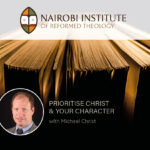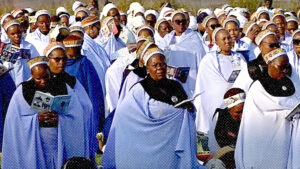TGC Africa hosted their first ever women’s conference in October 2024 at CORAT Africa in Nairobi, Kenya. TGC Africa Women are passionate about equipping and encouraging women to understand and read the Scriptures for themselves.
Courtney Doctor (Director of Women’s Initiatives, TGC Central) and Vanessa Hawkins (Fellow of The Keller Center) presented 3 engaging keynote sessions exploring The Big Story of Scripture: From Garden to Glory as well as deep dives into two of Jesus’ I AM Statements: I Am the Door and I Am the Good Shepherd.
This is the final talk given at the 2024 TGC Africa Women’s Conference. The first argued that to flourish as a human you need to locate yourself within God’s story. The second demonstrated that an abundant life is found only in God, whom we have access to through his Son. In this third talk, Courtney Doctor shows that Jesus is the good shepherd; and that it’s only by following him closely that we will grow personally.
But what does Jesus mean by calling himself the good shepherd? Regrettably our answer to that question is often more sentimental than theological. Many of us don’t recognise just how monumental a statement that was; and why it’s such good news for God’s people.
Fully God; fully man; fully shepherd; fully lamb.
Starting in the Old Testament, Courtney traces the language of the shepherd to show how the expectation was mounting for there to be the ultimate good shepherd; at times at shepherd even appears to be God himself. With that coming of Christ that longing is gloriously fulfilled in Jesus’ coming. In a quite delightful phrase, Courtney says that Jesus is sufficient for the role of the good shepherd and more, being “fully God; fully man; fully shepherd; fully lamb.”
The only sensible response to our good shepherd is faith; to trust in Jesus and walk closely with him. “Faith,” Courtney adds, “is using the voice that he gives you to answer his call, to respond to his call.” Importantly this is both our initial and ongoing response. For we must keep responding to his call, as the sheep of his pasture.
Other Content on Following Jesus
Pastor, To Tend the Sheep You Must Love the Shepherd
Women: Pursue God Through His Word
Weighed Down? Angry? Sad? Vent to God Not Social Media
Date: Saturday, 12 October 2024
Location: TGC Africa Women’s Conference, CORAT Africa, Nairobi, Kenya
Transcript
Shepherds in Scripture
Well, I have the easy job now, and you all have the hard job. I’ve heard it said that if you want to stay awake for a talk after lunch, you should be the one giving it. So, I will probably stay awake for the next little bit, but if you all yawn or need to stand up and stretch, please feel free to do so, because that lunch was delicious and filling. And if you are like me, now you are a little bit sleepy.
Have you ever read a book or watched a movie with a great plot twist in it? I was reading a book one time when my oldest son was about 12 years old. He’s an avid reader, and he had read the book. He walked into the room and said, “Oh, Mom, have you gotten to the part where you find out that this person is—” and I was like, “No! I haven’t gotten to that part yet, and now you have ruined it for me!”
But when I’m watching a movie like that, have you ever done that—where you’re watching a movie, and something happens in the movie, and you’re like, “What just happened?” And what do you do? You hit rewind because you want to go back and see, “Oh my goodness, when that happened, and then that happened, and then—that’s what they were talking about!” And it’s amazing.
Well, the Bible has plot twists and mic-drop moments in it also. So, I want you to open again to John 10. We’re going to pick up where Vanessa left off. We started this morning by talking about the story of Scripture, and then Vanessa has kind of led us through this theme of the door—the fact that there was a day the door closed, and then, praise God, there was a day the door opened, and the door has been provided. And so, it’s a theme that runs through Scripture.
But what I want to do is pretend that we are all at my house watching a movie. It would be a little cozy, but we would make it work. So, we’re going to be watching a movie, and the movie that we’re going to watch is the story of Scripture. But you all walked in about two-thirds of the way through the movie. Well, do you know what I would do? I would hit pause and say, “Let me give you a recap of what’s happened so far so that you’re caught up in the story.”
And here’s what I would say:
I should say surprisingly, shepherds have been kind of a low-key big deal so far in the story. You can go all the way back to Abel in Genesis 4. He was a shepherd; Cain was not. Remember, Cain killed Abel, but Abel was a shepherd. All of the major characters that you come across in the Bible were shepherds at one point in their lives. Abraham was a shepherd. Isaac was a shepherd. Jacob was a shepherd. All of Joseph’s family that went into Egypt—they were all shepherds. Moses was a shepherd during the middle 40 years of his life, and then it tells us in Numbers that he was like a shepherd to the people of Israel during the last 40 years of his life.
Right before he died, Moses prayed, “Let the Lord appoint a man over the congregation who shall lead them so that the congregation, or the people of God, may not be like sheep that have no shepherd.” (Numbers 27:16-17)
When God established the monarchy, or the kings, God said to Saul, the first king, “You shall shepherd my people.” (2 Samuel 5:2) And then we know that not all of the kings were good shepherds. In fact, some of the prophets speak directly to that. Jeremiah, Ezekiel, and Zechariah, they all point out that there had been leaders of the people of Israel who were like bad shepherds. They say things like, “You scattered the sheep instead of gathering them. You left the sheep instead of protecting them.” In one passage, it even says, “You ate the sheep instead of feeding them.” (Ezekiel 34:3)
And God was angry with these bad shepherds.
But then, it got a little bit confusing in the story of the shepherds because, in Ezekiel 34, God said, “I myself will be the shepherd of my sheep, and I myself will make them lie down. I will seek the lost, and I will bring back the strayed. I will bind up the injured, and I will strengthen the weak.” (Ezekiel 34:15-16) But then, in verse 23, He says, “And I will set up over them one shepherd, my servant David, and he shall feed them. He shall feed them and be their shepherd.” (Ezekiel 34:23)
So, as we’re watching the movie or reading the story, we were all like, “Wait a minute. So, is God going to be their shepherd, or is He going to send another man like David to be their shepherd?”
And that’s where we are in the story so far. We know that God had been like a shepherd to His people. We know that it is not good for sheep to be without a shepherd. And we know that the Lord had promised to either be a shepherd or send a shepherd.
Jesus is The Good Shepherd
So, I want you to open again to John 10. We’re going to pick up right where Vanessa left off in verse 11. And Jesus said, “I am the Good Shepherd.” (John 10:11) For everyone standing there that day, that would have been the line where they would have said, “What? Okay, rewind, because that is not what we were expecting!” Would God Himself be their shepherd? Yes. Would He send a man to be their shepherd? Yes.
And so, when Jesus says, “I am the Good Shepherd,” it’s meant to be this mic-drop moment. But Jesus is not finished yet. The story continues. In this passage, He has several more surprises in store for them and for us.
So, starting in verse 11 of chapter 10 of John’s Gospel:
“I am the Good Shepherd. The Good Shepherd lays down His life for the sheep. He who is a hired hand and not a shepherd, who does not own the sheep, sees the wolf coming and leaves the sheep and flees. And the wolf snatches them and scatters them. He flees because he is a hired hand and cares nothing for the sheep. I am the Good Shepherd. I know my own, and my own know me, just as the Father knows me and I know the Father. And I lay down my life for the sheep.
And I have other sheep that are not of this fold. I must bring them also, and they will listen to my voice. So there will be one flock, one shepherd. For this reason, the Father loves me, because I lay down my life, that I may take it up again. No one takes it from me, but I lay it down of my own accord. I have authority to lay it down, and I have authority to take it up again. This charge I have received from my Father.” (John 10:11-18)
So, instead of going verse by verse through this passage—which I would love to do—what we’re going to do is look at this passage in light of the entire shepherd story. And I want us to see that Jesus just continues to drop these surprises into the story—these plot twists into the shepherd’s story.
The Good Shepherd Seeks Unexpected Sheep
So, surprise number one: we’re going to see that the Good Shepherd seeks unexpected sheep. Look again at verse 16. He said, “And I have other sheep that are not of this fold. I must bring them also, and they will listen to my voice. So there will be one flock, one shepherd.” (John 10:16)
So, after Jesus’s declaration that “I am the Good Shepherd,” this would have been one of the first big surprises to everyone standing there that day. I mean, what did Jesus mean? Sheep from other folds? They would have been standing there thinking, “Surely not the Gentiles!”
Well, I would imagine that for most of us in this room, the good news is—that’s exactly what Jesus meant. He has always, like we said this morning, had His sights set on the whole world, bringing people from every tribe and tongue and nation into one flock, into one people of God.
In Luke 19, Jesus said that the whole reason he came was to seek and save the lost. He certainly meant, praise be to God, the Gentiles—who at that point were the outsiders, the pagans—but it wasn’t just the Gentiles that Jesus was talking about.
Another huge shepherd surprise is found in Luke 15 because Jesus was speaking to a Jewish audience here, to the Jewish religious leaders of the day. He says:
“What man among you, having a hundred sheep, if he has lost one of them, does not leave the ninety-nine in the open country and go after the one that is lost until he finds it? And when he has found it, he lays it on his shoulders, rejoicing. And when he comes home, he calls together his friends and his neighbors, saying to them, ‘Rejoice with me, for I have found my sheep that was lost.’ Just so, I tell you, there will be more joy in heaven over one sinner who repents than over ninety-nine righteous persons who need no repentance.” (Luke 15:4-7)
And then they would have been like, “What?” They weren’t saying, “Wait a minute, you don’t mean the Gentiles.” No, they were saying, “Wait a minute, are you talking about us? Surely not, Jesus! We’re not lost, right? We’re God’s people! We’re the ones that have the word and the covenants and the promises! We’re the religious ones!”
It would be like us today. I don’t know if you say this here in the States, but we say they were “church folk.” They were “good people.”
What Jesus is saying is that he came to seek and save the sheep, no matter who they are and no matter where they are. He came to seek and save those who appear to be religious and those who absolutely are irreligious in every way—for those who go to church and for those who haven’t set foot in one in years. He came to seek and save those who go to other churches as well as those who are in our churches. Jesus came to save the irreligious as well as those who merely appear to be religious.
But there is a third type of sheep that Jesus seeks, and it’s those that he’s already saved.
We aren’t singing it here, but do you sing Come Thou Fount? Come Thou Fount of Every Blessing? Well, every believer can sing this phrase:
“Jesus sought me when a stranger,
Wandering from the fold of God.
He, to rescue me from danger, (to save me)
Interposed His precious blood.”
This means he saves us for eternity—salvation. But the same hymn goes on to say:
“Bind my wandering heart to Thee.”
Because why?
“Prone to wander, Lord, I feel it,
Prone to leave the God I love.”
This is after we’ve been saved. Prone to wander.
So, I want you to think about all the ways a sheep can wander off. A sheep can stop listening to their shepherd’s voice and just slowly drift away. A sheep can see some grass in the other field that looks pretty green and yummy and just go see if it tastes a little bit better over there. A sheep can get too close to a ditch and fall in.
Y’all might have seen a sheep that has been rescued—I’ve seen a video of it—a sheep that has been rescued out of a ditch only to run a few feet down and fall into the exact same ditch again! Sometimes, sheep just get lazy, and they fall too far behind. They look up and realize they can’t see the shepherd, and they can’t hear the shepherd.
So, where are you today?
If you’ve been rescued from danger—if he has found you, if he has carried you home, rejoicing over your salvation—then do you know his voice? Do you spend time in his word, or have you stopped listening and are just slowly drifting away? Are you content with where he has you, or are you searching in other places, just nibbling in fields and areas that are not for you? Are you attempting to get too close to a ditch? Or are you running right back to the same ditch that he’s already rescued you from? Have you become weary of following and are just content to lag behind?
Friends, we’ve all been in all of those places—wandering here and there, drifting away, running away, falling away.
But here is more good news: The Good Shepherd came to seek and to bring back not only the irreligious, not only those who merely appear to be religious, but also the truly religious—those who truly belong to him but have wandered off.
Jesus is going to go on in John 10 and say, “No one can snatch them from my hand. No one can take the sheep from me.” (John 10:28)
Meaning, once you are saved—once he has sought you and saved you—you are forever safe. But that doesn’t mean you can’t wander off.
“Bind my wandering heart to You, because I’m so prone to wander.”
The Good Shepherd came to seek and save the lost but also the weary, the stuck, the hungry, the thirsty, the lame, the fearful, and the scattered. He has come to find us wherever we are today and to carry us back.
So, whether you’ve never been found or you have wandered away, listen to what Ken Bailey—a man with firsthand experience of shepherding—says. He tells the story of two brothers who lost their sheep:
“My brother and I sought for our sheep. For four hours, we walked in the moonlight over rocks and through thick, thorny bushes. We covered every part of the mountain, climbing and then descending again. We called for her. At last, weary and bleeding from thorns and sharp stones, we seemed to hear a faint response in answer to our call. Exhausted and perspiring, we kept moving, and to our unspeakable delight, we found her.”
And so it was the shepherd that came. It’s always the shepherd that comes to us. He was searching and searching and searching, calling and calling and calling.
And did you see what the sheep did?
She gave just an almost inaudible bleat, didn’t she? They barely heard her. It was just this faint response.
But the shepherd—who was searching and seeking—heard and came running.
So no matter where you are, friends, hear the shepherd’s voice calling you today, right here, right now. And ask him to give you a voice—so that you can, even with just the faintest response, we don’t have to be strong, we can be weak, we just have to answer his call.
That’s what faith is.
Faith is using the voice that he gives you to answer his call, to respond to his call.
And nothing—Scripture tells us, He tells us—nothing would delight him more than to carry you home. Because the whole reason he came was to seek and to save unexpected sheep—like you and like me.
The Good Shepherd Leads On Unexpected Paths
Surprise number two in the text is this: The Good Shepherd leads on unexpected paths—and don’t we know it?
Once the Shepherd has found you, carried you, saved you, and brought you into His flock, His desire—the Good Shepherd’s desire—is to lead you every day of your life and to have you follow, no matter how unexpected the paths may be.
So let me say that again because it’s really the point: His desire is to lead you every day of your life and to have you follow, no matter how unexpected the paths may be.
I’m sure you’ve already picked up on the fact that it is not a compliment to be called a sheep. Philip Keller is a man who grew up in East Africa and, for the greatest part of his life, was a shepherd. He said this about sheep:
“Sheep do not take care of themselves. They require tremendous care. You can’t just turn them out to pasture. They have—and I want you to listen to this—mob instincts, fears and timidity, stubbornness and stupidity, as well as perverse habits.”
Okay, there we go—that’s what it is to be a sheep.
Isaiah 53 says that all we like sheep have gone astray; we each have turned to his own way. (Isaiah 56:6) This is why we need a Good Shepherd—to search for us, to find us, to save us, and then to lead us every day of our lives.
If you have your Bibles open, please turn to Psalm 23. I skipped over it in the retelling of the Shepherd’s story, but it is arguably one of the most well-known and well-loved passages in all of Scripture, for a good reason. It is the Shepherd’s Psalm, and David, writing it, begins with the familiar words: “The Lord is my shepherd.”
What David was saying was that his Good Shepherd had supplied everything he needed. “The Lord is my shepherd; I shall not want.” (Psalm 23:1) A better translation is actually “The Lord is my shepherd; I shall not lack” or “I shall need nothing,” because there is a big difference between wanting and needing—wanting something and lacking something.
I wrote a Bible study a few years ago on the book of Romans, and I’m asked periodically what stood out to me. I mean, what a glorious book! But the thing that has stood out to me more than anything else—the thing that has stuck with me—is Romans 8:32. It was a verse that I really didn’t think much about before, but Paul wrote:
“He (God the Father) who did not spare His own Son but gave Him up for us all—how will He not also, with Him, graciously give us all things?” (Romans 8:32)
Paul is actually saying the same thing as David here, but with even more clarity, with even more understanding. Where David knew that God had provided everything he needed—God had protected him, forgiven him, and delivered him time and time again—Paul knew that not only had God done those things for him, but that God had actually given His one and only Son so that he, Paul, would not perish.
What Paul is saying in this verse is that this is the greatest gift imaginable—the most costly, most precious, most incomprehensible gift we could imagine. And so, what Paul is saying in Romans 8:32 is this: If God has already done this—the greatest thing possible—why would He withhold anything lesser?
It’s an argument from the greater to the lesser, and the answer is—He won’t.
And this verse ministers to my soul time and time again because there are things I want—there are small things and there are big things, there are good things that I want. And when it appears that God is not giving them to me, I run back to this verse. I run back to this truth, and I say to my soul: “The Lord is my good Shepherd; I will not lack. He’s already given me the greatest gift imaginable. And so, if I were to truly need this thing that it appears He is not giving, then I am going to choose to trust that I don’t need it—or I don’t need it yet—because that is who our God is.”
Why? Because we will lack no good thing. And I remind myself, deep in my soul, that our Shepherd’s ways are not our ways, are they? His thoughts are not our thoughts. And, friends, His paths are not our paths. He leads on unexpected paths, but in the same way that His thoughts and His ways are higher, better, and wiser than our ways and our thoughts, so are His paths. And so, I can trust that what He has provided and what He has withheld are infinitely better than what I think I want.
David was saying that the Good Shepherd, no matter where He leads, will supply everything you need because He Himself is everything you need.
So, David identifies a few paths. The first is: “He makes me lie down in green pastures, and He leads me beside still waters.” (Psalm 23:2) I had always pictured this verse in a particular way—kind of going from one luxurious green pasture to the next luxurious green pasture, from one gentle stream to the next gentle stream. But we have to remember where David lived.
David did not live in Tigoni. David did not live in a lush and fertile part of Israel. David lived in Northern Kenya. He lived in a dry and arid place. So, green pastures were neither common nor naturally occurring. One commentator points out:
“Green pastures did not happen by chance. They were the result of clearing rough, rocky land, of tearing out brush, roots, and stumps, of deep plowing and careful soil preparation. If his sheep were to enjoy green pastures, it meant he—the shepherd—had a tremendous job to do.”
The commentator goes on:
“And for the child of God, how He, the Good Shepherd, works to clear the rocks of stoney unbelief, to tear out the roots of bitterness, to break the hard, proud human heart that is set like sun-dried clay. He then sows the seed of His own precious Word, which will grow and produce rich crops of contentment and peace.”
And friends, as much as I want those luxurious, easy green pastures, this is the green pasture that I need most—a place that is free of pride, free of unbelief, free of bitterness, but rich in contentment and peace.
And how does He lead us there? How do we follow Him into these pastures that He is preparing for our own hearts? Well, we have to spend time with Him, and we have to spend time with Him in His living Word because it is His Word that will instruct us, rebuke us, correct us, and train us. It is in His Word, by His Spirit, that He breaks up the hard soil of our hearts, rips out the roots of bitterness and pride, and renews us.
We get to participate with Him in this. We get to follow Him into these green pastures by repenting, by obeying, by believing, and by humbling ourselves. And so, we feed on His Word and we drink deeply from the well of His salvation because, friends, these are the green pastures and the quiet waters that will sustain us like no other. They will satisfy us like no other.
The next thing that David says about his Good Shepherd is that “He restores my soul.” (Psalm 23:3) Well, sheep not only wander off and drift away, but they also can easily become cast down. Philip Keller again wrote,
“Cast down is an old English shepherd’s term for a sheep that is turned over on its back and cannot get up again by itself.”
He goes on,
“Even David—and I want you to capture this—even David, who was much loved of God, knew what it was to be cast down, knew what it was to be cast down. David was acquainted with the bitterness of feeling hopeless and without strength. In Psalm 42, he cried out, ‘Why are you cast down, O my soul?'”(Psalm 42:5)
And we all know what it is like to be cast down—to be unable to get up on our own, to be knocked off of our feet. Keller again explains how he, as a good shepherd, as a human, good shepherd, responded to his sheep when they were cast down. He said,
“I would spend hours searching. Then I would see it at a distance, down on its back, lying helpless. At once, I would start to run toward it, hurrying as fast as I could to restore it.”
So, if a mere human shepherd had this much concern, compassion, and tenderness for his downcast sheep, how much more—again, how much more—does our Good Shepherd have? Isaiah 42:3 says,
“A bruised reed He will not break, and a smoldering wick (faintly burning wick), He will not quench.”
So, if you find yourself in that place today—if your soul is cast down, if you find yourself down and unable to get up again, if you feel bruised and battered by life, or if your light seems as if it is barely flickering—then, friends, look to the Good Shepherd of your souls.
He is filled with compassion. He is filled with mercy. He loves you. And you will not be cast down forever. You will not be cast down forever.
He will restore your soul. It is what He tells us in His Word.
And then, David goes on to say that our Good Shepherd also leads us in paths of righteousness for His name’s sake. (Psalm 23:3)
Well, that’s a verse that I pray almost every day—for me and for my family. Lead me, lead us in paths of righteousness. And it implicitly means that not all paths we walk are paths of righteousness.
And don’t we know it? We know it. Sometimes we don’t know it until after we’ve walked it down a little ways—until we’re pretty far down that path. But let’s be honest—more often than not, we know when we start on that path that this is no path of righteousness.
So what do we do? If we’re at the front end and there’s a path that looks like we could take it—and we know it is not a path of righteousness—call out and ask your Good Shepherd to lead you on paths of righteousness.
Psalm 40 says He will set your feet on solid ground. Psalm 18 says He will keep you from slipping. Proverbs 3 says He will make your paths straight.
But if you are already partway—or pretty far down—a path of unrighteousness, stop and turn around. That’s what repentance is. You don’t have to keep going. You can stop.
That is what the Shepherd wants—no matter how far down the path you are, no matter how many paths of unrighteousness you have walked. Your Shepherd wants you to come back, and He wants to show you how beautiful paths of righteousness actually are—because His ways are good, His thoughts are good, and His paths are good.
And so, the call to follow is a call to trust Him and to walk in them.
The next verse is probably the most well-known verse in all of Scripture. I memorized it as a child in the King James Version, and it says this:
“Yea, though I walk through the valley of the shadow of death, I will fear no evil, for Thou art with me.” (Psalm 23:4)
The valley of the shadow of death. I want you to first notice that this is still a path that the Shepherd has for His sheep. They haven’t wandered off. In fact, David comes to this path while walking in paths of righteousness. He didn’t do anything wrong. He hadn’t wandered away—he was following his Good Shepherd.
There are times in everyone’s life when our Good Shepherd leads us through dark valleys—times when it feels like the darkness is closing in, like fear and anxiety and shame and sadness and grief, as if those are the things that are going to win, like they might just kill us. David knew those places.
Psalm 6 says:
“I am weary with my groaning; every night I flood my bed with tears. I drench my couch with my weeping. My eye wastes away because of grief.” (Psalm 6:6-7)
And we understand that. We know that place. We know what it is to be curled up in a fetal position, sobbing for a variety of reasons.
Yet, knowing this valley of darkness, David still said:
“Even though I walk through the valley of the shadow of death, I will fear no evil.” (Psalm 23:4)
So I want to know why. How could David say that? Why did David say that?
His answer is actually the center of the Psalm. It’s the whole point of it. The whole Psalm culminates in this phrase:
“Because You are with me.”
Because You are with me.
It is not the removal of the darkness that comforts David. It’s the nearness of his Shepherd that offers him comfort. One scholar said, “The darker the shadow, the closer the Shepherd.”
That changes everything.
It changes everything to know that in your darkest valley, in your darkest moments, you are not alone.
So when you’re in that place—or if you’re in that place—what do we do?
What did David do? He reminded himself of a few things. He reminded himself that his Good Shepherd was with him. He thought about and believed, actively, “You will not leave me or forsake me.” Remember in John 10? The hired hand flees, but the Shepherd stays.
And we remind ourselves that the valley will end.
Did you see where the Shepherd was leading?
He was leading through the valley.
And that’s true for all the valleys that we walk in life. It’s true for the final and darkest valley of all—the valley of the shadow of death.
Because if Jesus doesn’t come back first, that’s a valley that we’re all going to follow our Good Shepherd through. But that’s the point: the valley is not the destination.
The valley is simply…David knew that he was going to walk into the valley of the shadow of death. And he knew that he was going to walk out the other side.
David didn’t know how.
David didn’t know how his Shepherd was going to lead him through—just that He would.
But, friends, we do know. Jesus tells us in John 10. We are told how our Shepherd is going to see us through this valley—by going through first.
The Good Shepherd Dies An Unexpected Death
And so the third surprise in this text is that the Good Shepherd dies an unexpected death.
Jesus said three times that He would lay down His life for His sheep:
Verse 11: “The Good Shepherd lays down His life for the sheep.”
Verse 15: “I lay down My life for the sheep.”
Verse 17: “I lay down My life.”
And this is the second biggest surprise in this text.
No one would have seen this coming.
The shepherd’s not supposed to die—at least, not voluntarily.
But Jesus had one more surprise in store in this text:
“I will willingly lay down My life… that I may take it up again.” (John 10:17)
Verse 18: “No one takes My life from Me, but I lay it down of My own accord. I have authority to lay it down, and I have authority to take it up again.” (John 10:18)
I don’t know if, when you were a child, you watched shows – in the States, it seems like all the shows for children that have good guys and bad guys, the good guys always ended up trapped at the end of a canyon. Does this happen here in shows? They’re always end up trapped at the end of a canyon.
The bad guys are up on the mountains, on the cliffs around them. They have all the advantage. They have all the good shots. The good guys are down there, surrounded by their enemies, and there’s nowhere to go.
I mean, this is the end of the road.
They are trapped.
And we are meant to feel: this is sure death for them.
Well, what Jesus did in His death and resurrection—He willingly walked into that dead-end canyon. The one with absolutely no way out. Surrounded by His greatest enemies—and ours—of sin and death.
They were enemies that, up until this point, had won every single time.
And Jesus willingly walked into this valley.
And He was killed.
And His body lay there for three days, seemingly stuck like the rest of us.
But on the third day—with one miraculous inhale and one mighty exhale—do you know what happened?
The back of that dead-end canyon burst open.
A new way. A new path. A new valley was forged.
It previously did not exist. But now it does.
And so none of us walk into a dead-end canyon of death. If we are in Christ, we are going to walk through the valley that He created for us—into a greater and more glorious destination.
Not alone—but with Jesus.
Not in fear—but in faith.
Not in defeat—but in victory.
Because that is what Jesus, our Good Shepherd, did for us.
But you know, I love the story of God. And so I want to go all the way to the end. Because there is one more big surprise for us.
The same John who captured these words in John 10 was given a vision of the end of the story.And in Revelation 7, when he saw the great throne of God—guess who was being worshiped?
The Lamb of God.
But here’s the surprise.
It says, in Revelation 7:17:
“For the Lamb in the midst of the throne will be their Shepherd.”
Not only did the Son of God become a man for our sake—
The Good Shepherd became a Lamb for our sake.
Fully God. Fully man. Fully Shepherd. Fully Lamb.
We are all like sheep and so He became one of us.
But perfect in every way—a Lamb truly without spot or blemish.
A Lamb that was sent in order to be selected for slaughter because He was the most perfect Lamb. A Lamb that was slaughtered so that you and I wouldn’t be. A Lamb so perfect that no other lamb ever need die.
When we sing Amazing love, how can it be—I mean, that’s what we’re singing.
And I don’t have the answer to that question.
Why?
I don’t know.
How can it be?
Know The Good Shepherd
But I can speak to what our response should be.
What does the Good Shepherd desire from His sheep? And it’s so simple. It’s so simple that it seems almost obvious. But in John 10, the word know is used five times.
The sheep know the Shepherd’s voice.
The Shepherd knows His sheep.
His sheep know Him. And this word know indicates deep and intimate knowledge.
It is a knowing, deep in your soul, who Jesus is, what He’s done, and what He will do.
So how do we—unexpected sheep, on unexpected paths—respond to our Good Shepherd?
You spend your life knowing Him more. And more. And more.
Jesus is always more than what we currently know Him to be. He is always greater; He is always more. And so, as you learn more about His ways, more about His will, more about His glory, I promise you—you and I—we will love Him more, we will trust Him more.
And as you know His voice, you will know deep in your soul that when you’re lost, He is going to find you. When you’re weary, He is going to carry you. When you’re afraid, He is going to draw even closer. When you wander off, He’ll call you back. When you’re cast down, He will restore you. When you’re hungry, He will take you to green pastures. When you’re thirsty, He is going to take you to waters of rest.
What you need, He will provide, and you will know deep in your soul that when you walk through the valley of the shadow of death, He will be there. He will be there. He will never leave you; He will never forsake you.
And so, friends, know this Good Shepherd and follow this Good Shepherd all the days of your life.
Let’s pray.
Almighty God—Father, Son, and Holy Spirit—there is none like You. You are so merciful and kind and faithful and mighty and powerful. You’re mighty to save.
We say thank You. We say we praise You. You are worthy of our lives, Lord. Cultivate in each one of us deep trust and the ability to follow, no matter where You lead, knowing that You are our Good Shepherd.
We pray in Your name.
Amen.
Courtney Doctor (MDiv, Covenant Theological Seminary) serves as director of women’s initiatives for The Gospel Coalition. She’s a Bible teacher and author of From Garden to Glory: How Understanding God’s Story Changes Yours as well as several Bible studies including In View of God’s Mercies and Behold and Believe. Courtney and her husband, Craig, have four children, three children-in-law, and five beautiful grandchildren. You can follow her on Instagram or find out more at courtneydoctor.org.














